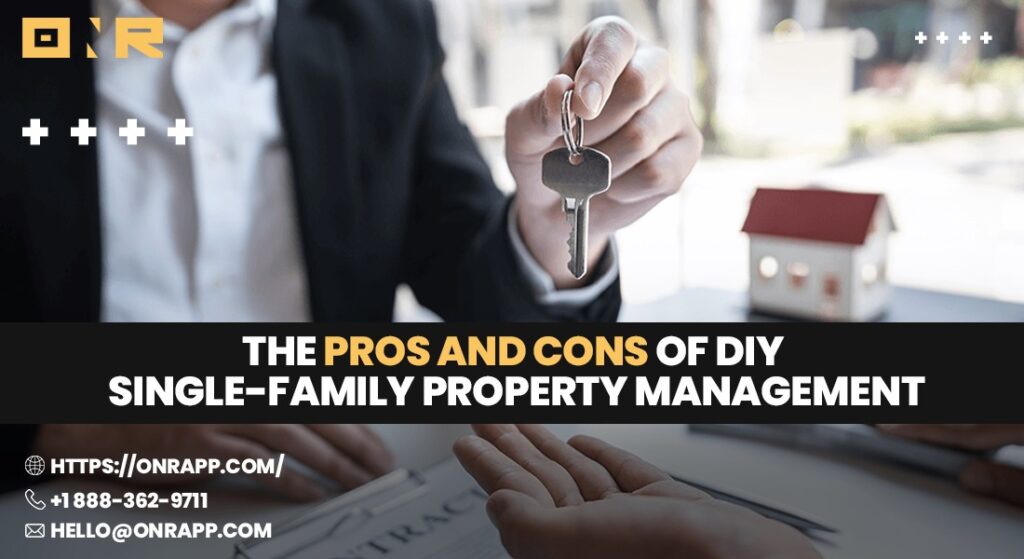
Navigating the world of single-family property management can be a complex task, especially when deciding between managing it yourself or engaging professional services. This blog explores the intricacies of DIY (Do-It-Yourself) single-family property management, delving into the benefits of property management software and its challenges. We aim to provide a comprehensive overview that will help property owners make informed decisions. Whether you’re inclined towards a hands-on approach or considering the services of a professional property management firm, understanding the pros and cons of each option is crucial in today’s dynamic property management landscape.
The Definition of Single-Family Property Management
Single-family property management involves overseeing and maintaining a residential property. This management encompasses a range of responsibilities including upkeep, repairs, financial management, compliance with regulations, and ensuring the property meets certain standards and requirements. According to Limehouse Property Management, an expert property management in Hampton Roads VA, unlike larger multi-unit properties, managing a single-family property often requires a more individualized approach, given each property’s unique characteristics and needs.
What are the Challenges of Single-Family Property Management?
Managing a single-family property comes with its set of challenges. One of the primary challenges is the time and effort required for the ongoing maintenance and repairs. Keeping up with regular upkeep, addressing emergency repair needs, and ensuring the property remains in top condition can be a demanding task.
Another significant challenge is staying updated with legal and regulatory requirements. This includes understanding and complying with local regulations, which can often be complex and subject to change. Failure to comply with these regulations can result in fines and legal issues.
Financial management is also a crucial aspect, requiring meticulous record-keeping and budgeting. Managing expenses, understanding market trends for optimal financial decisions, and ensuring a positive financial outcome can be intricate and require substantial financial acumen.
What is DIY Property Management?
DIY property management refers to property owners personally managing their property without the assistance of a professional property management firm. This approach involves handling all aspects of property management, from maintenance and repairs to financial management and compliance with regulations.
DIY property management also offers owners more control over their property. They can make decisions directly, choose their service providers, and manage their property as they see fit. However, this greater control comes with increased responsibilities and the need for a broad skill set to handle various aspects of property management successfully.

The Impact on Cost Savings
DIY property management can significantly impact cost savings for owners of single-family properties. By opting to manage the property themselves, owners eliminate the need to pay a management firm, which can be a considerable saving. This can be especially beneficial in times of financial constraints or when trying to maximize the financial potential of the property.
However, it’s important to consider the indirect costs associated with DIY property management. These include the time spent on various tasks, potential missed opportunities due to lack of expertise, and the cost of resources and tools needed for effective management. Additionally, if maintenance and repairs are not carried out effectively, it could lead to more significant expenses down the line. Therefore, while DIY property management can offer immediate cost savings, it requires a careful assessment of these indirect costs to understand its true financial impact.
Comparing DIY Property Management and Property Management Firms
When comparing DIY property management to hiring a property management firm, several key factors come into play. Professional firms bring expertise, efficiency, and experience to the table. They have established systems for maintenance, financial management, and compliance with regulations, ensuring the property is managed effectively and efficiently. Their expertise can also lead to better decision-making, potentially resulting in higher financial returns in the long run.
On the other hand, DIY property management allows for direct control and personal involvement in the management process. It can be particularly satisfying for those who have the time, skills, and interest in hands-on management. However, it requires a significant investment of time and effort, and there’s a learning curve involved in understanding the various aspects of property management.
Ultimately, the choice between DIY property management and hiring a firm depends on individual circumstances, including the owner’s expertise, time availability, and financial considerations.
Strategies for Maintenance Management for Single-Family Property Management
Effective maintenance management is crucial in single-family property management, whether it’s DIY or through a firm. Here are some strategies to ensure efficient maintenance:
- Regularly schedule and conduct preventive maintenance checks. This proactive approach helps in identifying and addressing potential issues before they escalate into significant problems.
- Keep a detailed schedule for regular maintenance tasks such as inspections, cleaning, and servicing of systems. This helps in staying organized and ensuring no aspect of property upkeep is overlooked.
- Develop relationships with trustworthy and skilled contractors who can be called upon for various maintenance needs. This network is invaluable for timely and quality repairs and services.
- Utilize property management software or apps to track maintenance tasks, store records, and set reminders. Technology can significantly streamline the maintenance management process.
- Conduct thorough inspections regularly to assess the property’s condition. This can help in identifying issues early and planning maintenance work accordingly.
- Allocate a specific budget for property maintenance. This ensures that funds are available when needed and helps in making informed financial decisions regarding maintenance works.
- Keep up-to-date with the latest trends and best practices in property maintenance. Continuous learning can lead to more effective and innovative maintenance strategies.
At ONR, we specialize in simplifying single-family property management through our innovative software solution. Designed specifically for streamlined management, ONR offers a suite of tools that make maintenance scheduling, financial tracking, and compliance management effortless and efficient. Our user-friendly interface ensures easy navigation, while our advanced features like real-time updates and automated reminders keep you on top of every aspect of your property. Whether you’re a seasoned manager or new to property management, ONR equips you with everything you need to manage your single-family property effectively, saving both time and costs while enhancing overall management quality.


